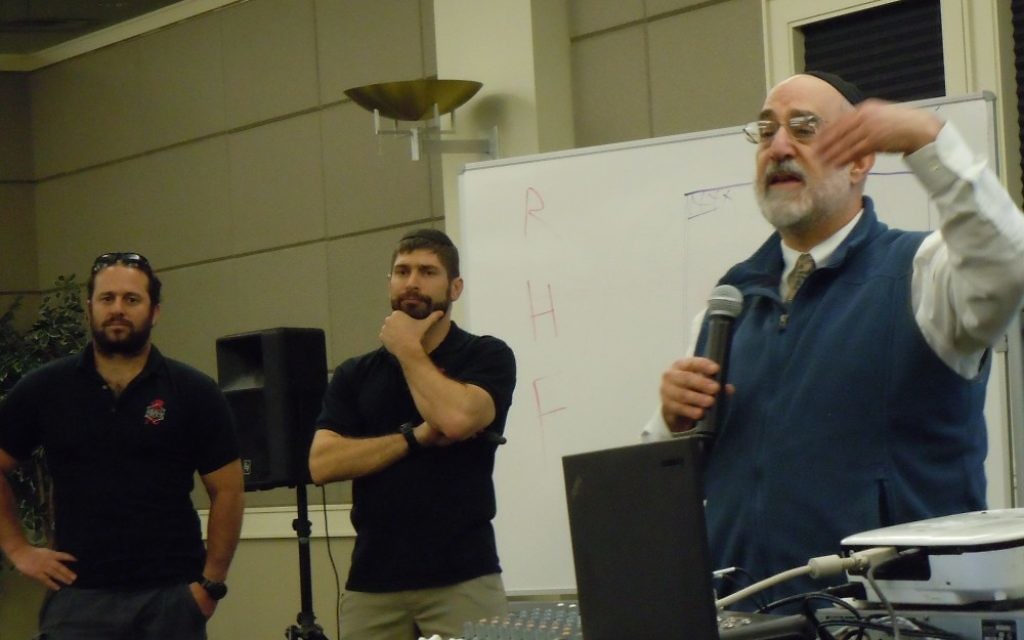Paying Extra for Protection
Jewish Atlanta has a model security program, but constant assessment and improvement aren't cheap.

In August 2014, an article provocatively titled “End the ‘Jew Tax’ ” appeared on The Huffington Post.
At the time, the war in Gaza was blamed for a spike in anti-Israel and anti-Jewish sentiment.
“The poisonous impact is deeply personal for every Diaspora Jew. My family and many others pay what I’ve dubbed the ‘Jew Tax’; that is, the portion of our suburban Chicago synagogue dues that goes for surveillance cameras, alarms and a security guard on duty during services and when kids are in Hebrew school,” wrote Michael Millenson, a self-described “religiously serious” Jew (who also is an expert on health care economics).
Get The AJT Newsletter by email and never miss our top stories Free Sign Up
Millenson revisited the subject in January 2015, when French Jews were being attacked.
“I wrote in August how some Jewish organizations have taken down identifying signs and how one Jewish day school protects its parking lot with thick steel gates designed to deter would-be car bombers. I lamented that the anti-Israel anti-Semites who cannot put us in ghettos have slowly forced us to build our own walls. The problem has steadily grown,” he said.
The “Jew tax” came to mind when my congregation sought donations to enhance security.
By the time you read this, we will know more about the young man arrested in Israel in connection with bomb threats telephoned and emailed to Jewish institutions in the United States and other countries.
Even if his arrest clears up those threats, the gravestones in Jewish cemeteries have not toppled by themselves, synagogues are not vandalized by remote control, and online hatred is not expressed by accident.
To be clear, anti-Semitism has plagued the Jewish community for many years, irrespective of who sits in the Oval Office (though the current occupant’s election campaign did seem to embolden a particular strain of bigot).
Incidents the past few months have prompted Jewish institutions to examine their security.
The website of the Marcus Jewish Community Center, which received threats by telephone and email, includes a page welcoming online donations to its security fund.
Bomb threats also have been called in to Atlanta Jewish Academy and the Atlanta office of the Anti-Defamation League.
“In the world of security, there are always improvements you can make,” said Cathal Lucy, the 25-year veteran of the U.S. Secret Service who has managed the security portfolio for the Jewish Federation of Greater Atlanta since October 2015. “Emergency action plans are live documents. That’s something that should be reviewed continuously.”
Lucy praised his predecessor, Dick Raisler, who made Atlanta one of the first federations to create a community security program and in 2014 hosted the first conference of federation security directors.
“We are kind of like the template, if you will, for other federations,” Lucy said.
Lucy meets every three months with a committee whose 100-plus members represent Jewish institutions throughout the area. He maintains regular contact with the Secure Community Network, an arm of the Jewish Federations of North America and the Conference of Presidents of Major American Jewish Organizations. Year-round, he keeps local institutions informed, works with them on training their staffs and makes security inspections.
“Security is expensive, and things cost money to implement,” Lucy said. “It’s kind of difficult to inject security changes instantly when a situation happens.”
Jewish institutions have taken advantage of funds provided through the Nonprofit Security Grant Program administered by the U.S. Department of Homeland Security.
Since 2007, Atlanta’s Jewish community has received nearly $3 million.
Three weeks ago, “at a time when children are being evacuated from daycare centers in response to repeated bomb threats and Mosques are deliberately being set on fire,” 19 U.S. senators sent Homeland Security Secretary John Kelly a letter urging an increase in the grant program’s funding from $20 million in fiscal 2017 to $50 million next year.
But President Donald Trump’s proposed budget would fold that money into general emergency preparedness grants given to the states, a prospect that JFNA objected to in testimony before Congress.
My congregation asked for $50. Another congregant suggested using multiples of 18.
So $54 it was.




comments